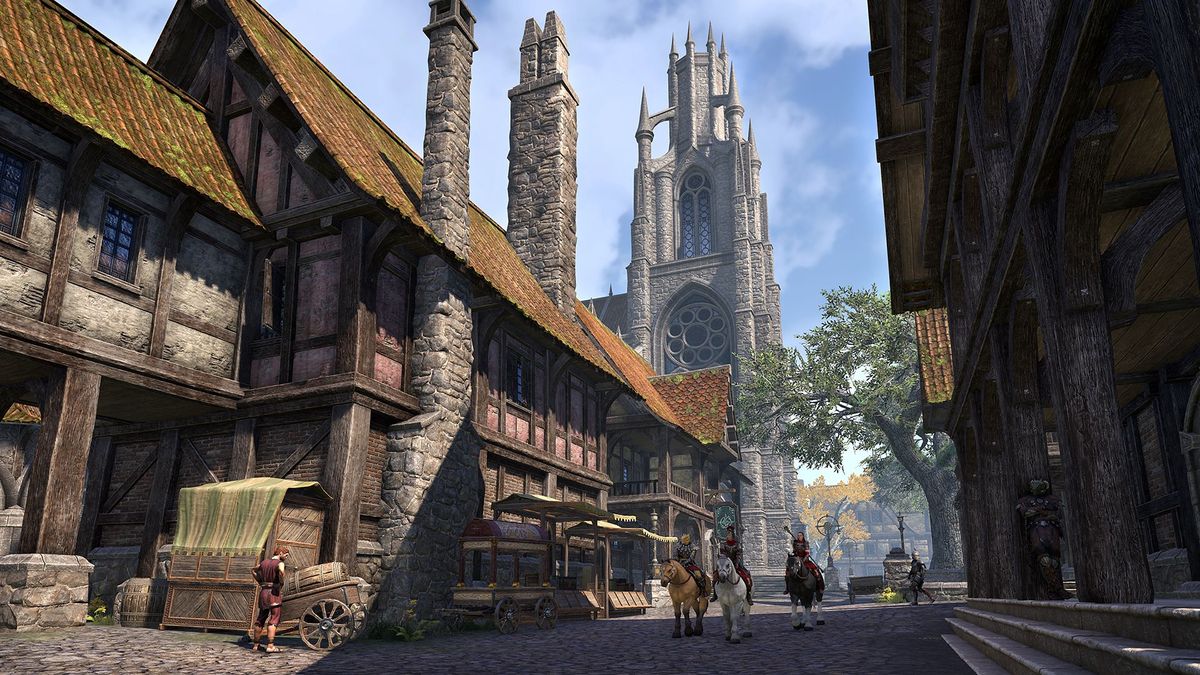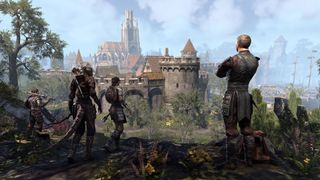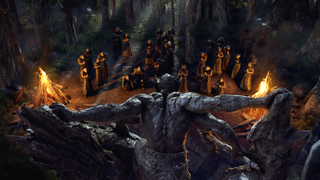Elder Scrolls Online: Gates of Oblivion is a lot more than an MMO TES4
ESO Creative Director Rich Lambert talks Gates of Oblivion, Blackwood, and how they're unique from and similar to The Elder Scrolls 4: Oblivion

Elder Scrolls Online: Gates of Oblivion is the follow-up to last year's Dark Heart of Skyrim adventure, with the massive Blackwood expansion taking center-stage in June with 30 hours of new story content, a new zone, the Companion system, and loads more. And despite the fact that its name calls back to a beloved game, Gates of Oblivion is a whole lot more than a massively multiplayer version of The Elder Scrolls 4: Oblivion.
Creative Director Rich Lambert, himself a producer on The Elder Scrolls 4, joined me on a video call to talk about everything coming to Elder Scrolls Online this year. As you might expect, you'll be able to explore some familiar locales as they were 800 years before the events of Oblivion, but Lambert describes most of the new content as ZeniMax's "own take on things." There's also a greater focus on the hellish domain of Oblivion villain Mehrunes Dagon, the Deadlands, and we'll even get to explore a re-imagined version of the city of Gideon, which hasn't appeared in a game for 27 years.

"It's not going to be a direct one-to-one," Lambert says. "Mehrunes Dagon is still kinda trying to figure out the science behind the Oblivion Gates... But there's gonna be familiar undertones. So, Leyawiin is the capital city. And so, Leyawiin is still roughly the same shape, same size as it is in our time."
"So there's Leyawiin in the West, and then in the East, we've got Gideon, which hasn't been seen since 1994 in Arena. And then of course Dagon's realm as well. But then everything kind-of in between that is our own take on things. And even Dagon's realm is kind of our own take. We will have that kind of fire and brimstone part, especially in the fourth quarter, when you go to spend all your time there and really explore [Dagon's] realm, you're going to see more of what his realm is than just what you saw in TES4," Lambert says.
When I asked about Lambert's favorite Oblivion memories, he goes back to Mehrunes Dagon, which explains why deeper focus into the character and his world beyond the titular Gates of Oblivion.
"So Mehrunes Dagon is probably my favorite Daedric prince out of all of them. So that was kind of the big thing for me was getting to explore more of him and figure out a little bit more of who he is and what he's all about. He's kind of a creature to his own devices, where, you know, he's the prince of destruction and change and ambition and whatnot. So he can't really re-envision himself that much. But we got to spend more time focused on that and telling more of his story, which has been a lot of fun for me," Lambert says.

The Gates of Oblivion story will be told throughout the year, starting with the Flames of Ambition DLC, which will add context and set up the events of Blackwood. I asked Lambert about some of the moving parts brewing ahead of the starting line.
Sign up to the GamesRadar+ Newsletter
Weekly digests, tales from the communities you love, and more
"The Longhouse Emperors entered into a pact, or made a deal with the devil, essentially, with Mehrunes Dagon, where they would help him invade Tamriel as long as they got to rule [Tamriel] in his image. So, that was their offer to him. He took them up on it, and he gave them the power they needed, in essentially creating four weapons of mass destruction," Lambert explained.
"One of the neat aspects to this is, in our time, you know, ESO kicks off just after the last of the Longhouse Emperors has been killed. So their line is no more, but the pact is still in place. And somebody is kind of moving this whole story forward. And so that's one of the big reveals is, how and why," he teases.
When Blackwood launches in June, it won't conclude the story of the Gates of Oblivion, but it will take up a sizeable chunk leading into the latter half of the year. It'll also introduce a new 12-player trial, new world events called Oblivion Portals (effectively replacing Dark Anchors), and most significantly, the new Companion system that'll let you recruit and play alongside NPCs. Lambert says the idea behind Companions is to allow solo players and small groups to take on dungeons without worrying about becoming overwhelmed. As a solo player myself, I bluntly asked Lambert what took so long for something like that to be added.
"I think we've learned a lot over the years. And one of the main, recurring themes that we've heard from players, especially our more hardcore Elder Scrolls people, is people are scary. And there's some content that they aren't necessarily comfortable within a large group, but they would do with a couple of close, trusted friends. And so the beauty of this system and one of my hopes is, you know, you and a buddy could go and do four-player dungeons because you have two companions to help you out."
Another benefit to the upcoming Companion system, Lambert hopes, is that it'll give folks the confidence to take on tougher dungeons, thereby getting the chance to mingle and engage more with the ESO community.
"It will help players, A) develop stronger social ties in-game with their companions, but also, B) help them kind-of edge a little bit more into some of the group content and meeting other players potentially, which is really exciting to me, because that's where the magic of MMO happens, you know, meeting other people and talking with them and developing those really close social ties."
After scoring a degree in English from ASU, I worked as a copy editor while freelancing for places like SFX Magazine, Screen Rant, Game Revolution, and MMORPG on the side. Now, as GamesRadar's west coast Staff Writer, I'm responsible for managing the site's western regional executive branch, AKA my apartment, and writing about whatever horror game I'm too afraid to finish.

After 12 years, the modders merging Morrowind and Skyrim say their project would "come out faster" if "we were all working with Bethesda," but it would be "much worse"

RPG veteran Josh Sawyer says Skyrim is the perfect example of why it doesn't matter if players finish games because "a lot of people never finish the crit path," but "they love it"